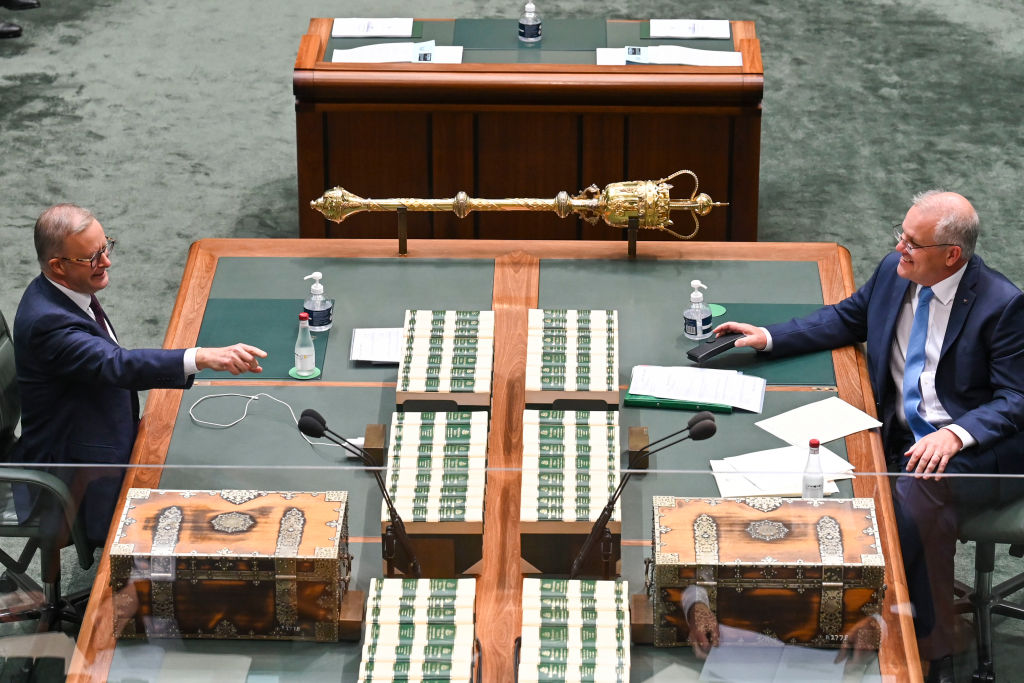 Print This Post
Print This Post- The Strategist - https://www.aspistrategist.org.au -
The (geo)politics and (geo)economics of Australia’s election
Posted By Graeme Dobell on April 4, 2022 @ 06:00

‘Tonight, as we gather, war rages in Europe. The global pandemic is not over. Devastating floods have battered our communities. We live in uncertain times.’
— Treasurer Josh Frydenberg, budget speech, 29 March 2022
As an energy and food exporter with very limited direct trade exposure to Russia, Australia is better placed than most countries to absorb the economic effects of the conflict and associated disruptions. Higher fuel and other prices will negatively affect consumers and dampen consumption growth, but higher commodity prices will provide a positive boost to national income through higher export earnings.
From the warnings of the war. To the intelligence on false flag operations designed to provide a fake premise to the invasion. And more recently, to the Russian plans to falsely claim Ukrainian use of banned chemical weapons.
On this and many other subjects, deeply secret intelligence is being released to make sure the truth is heard. At this pace and scale, it really is unprecedented.
We know both Presidents Xi and Putin place great value on their personal relationships. But Xi’s calculus is more nuanced. He’s not publicly condemned the invasion, presumably calculating that it helps him oppose the US. And, with an eye on retaking Taiwan, China doesn’t want to do anything which may constrain its ability to move in the future …
But there are risks to them both (and arguably more for China) in being too closely aligned. Russia understands that long term, China will become increasingly strong militarily and economically. Some of their interests conflict; Russia could be squeezed out of the equation.
And it is equally clear that a China that wants to set the rules of the road—the norms for a new global governance—is not well served by close alliance with a regime that willfully and illegally ignores them all.
Article printed from The Strategist: https://www.aspistrategist.org.au
URL to article: https://www.aspistrategist.org.au/the-geopolitics-and-geoeconomics-of-australias-election/
[1] Josh Frydenberg: https://ministers.treasury.gov.au/ministers/josh-frydenberg-2018/speeches/budget-speech-2022-23
[2] national security: https://www.abc.net.au/news/2022-03-30/budget-urkraine-global-uncertainty-war/100949152?utm
[3] Ukraine will mean: https://budget.gov.au/2022-23/content/bp1/download/bp1_2022-23.pdf
[4] ‘redacted’: https://www.dfat.gov.au/sites/default/files/dfat-foi-1905-f2195.pdf
[5] ‘deteriorating strategic environment’: https://www.dfat.gov.au/about-us/corporate/portfolio-budget-statements/Pages/portfolio-budget-statements
[6] ‘a new arc of autocracy’: https://www.pm.gov.au/media/virtual-address-lowy-institute
[7] Department of Defence: https://www.minister.defence.gov.au/minister/peter-dutton/media-releases/budget-2022-23-delivers-record-investment-defence-and
[8] Marcus Hellyer: https://www.aspistrategist.org.au/defence-budget-shows-signs-of-a-different-approach-but-is-it-changing-fast-enough/
[9] REDSPICE: https://www.asd.gov.au/sites/default/files/2022-03/ASD-REDSPICE-Blueprint.pdf
[10] most significant: https://www.asd.gov.au/about/redspice?gclid=EAIaIQobChMIh47MlL3x9gIV2JVLBR2YPwspEAAYASAAEgIqdvD_BwE&gclsrc=aw.ds
[11] ‘a period of generational upheaval’: https://www.gchq.gov.uk/speech/director-gchq-global-security-amid-russia-invasion-of-ukraine
[12] strategic economic dialogue: https://www.trademinister.gov.au/minister/dan-tehan/media-release/australia-and-united-states-hold-inaugural-strategic-economic-dialogue
[13] Supply Chain Resilience Initiative: https://www.dfat.gov.au/news/media-release/joint-statement-supply-chain-resilience-initiative-australian-indian-and-japanese-trade-ministers
[14] counter China’s dominance: https://www.bloomberg.com/news/articles/2021-04-27/supply-chain-initiative-from-japan-india-australia-under-way
[15] price: https://www.aspistrategist.org.au/talk-us-think-china/
[16] bid adieu: https://www.pm.gov.au/media/address-national-press-club-barton-act
[17] suspended: https://apnews.com/article/china-australia-financial-markets-business-3fad25a83915d67989cfa2b3ad7e7c27
[18] Australia–US Strategic Commercial Dialogue: https://www.trademinister.gov.au/minister/dan-tehan/media-release/joint-statement-inaugural-australia-us-strategic-commercial-dialogue-ausscd
[19] attempt to create: https://crsreports.congress.gov/product/pdf/IN/IN11814
[20] ‘Indo-Pacific economic framework’: https://www.whitehouse.gov/briefing-room/speeches-remarks/2022/02/11/fact-sheet-indo-pacific-strategy-of-the-united-states/
[21] Comprehensive and Progressive TPP: https://www.dfat.gov.au/trade/agreements/in-force/cptpp/comprehensive-and-progressive-agreement-for-trans-pacific-partnership